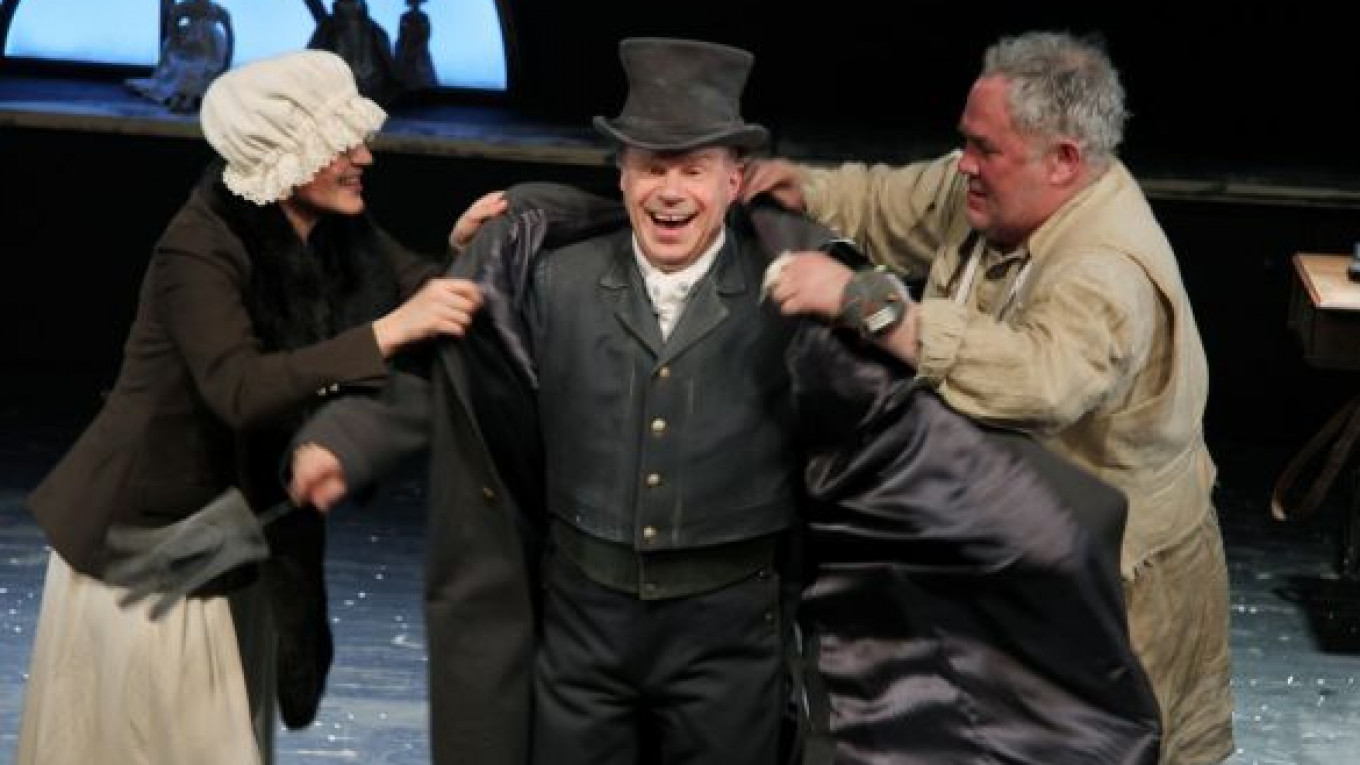Nikolai Gogol’s “The Overcoat” tells a tale that, one expects, will always remain accessible and meaningful for Russian culture. In it a mild, shy government clerk dares to better his life in the most modest of ways — he wants to replace his threadbare old coat — but is punished cruelly by fate and colleagues for this bit of hubris.
A new dramatization of the tale at the Moscow Art Theater particularly brings out the cruelty and punishment. In this version adapted and directed by Anton Kovalenko, the clerk is clearly in dire straits from the very first moment.
Essentially before the performance even begins, a wall at mid-stage opens to reveal a frightened man staring us in the face and shouting, “Help!” at the top of his lungs. I don’t think I risk giving away the ending of this short story, originally published in 1842, but if you are averse to spoilers of any kind, you may want to skip this next sentence: Help never comes.
Kovalenko filled the stage with an antagonistic chorus, three men who play various roles, including the clerk’s fellow employees at a government office. But they are more than that — they are representatives of a national character that includes everything from the penchant for singing beautiful folk songs to kicking a man when he is down. They are individuals, but they are also a small, composite picture of society.
As played by Valery Malinin, Artyom Bystrov and Valery Troshin, these are the figures through whom the story reaches us. Each has his own particular quirks, depending on what role he plays at any given moment. Troshin introduces a bit of refined sadism into the works, while Malinin tends to reflect a cultured air that never hinders his characters’ vindictiveness.
Bystrov is a bit of a dissident, if I may put it that way. His characters seem to express a modicum of pity and understanding for the hapless clerk, although never enough to stop from joining in the persecution.
This mean and nasty trio often hides behind, or emerges from, enormous, empty overcoats that hang on runners from the flies and can be flung from one end of the stage to another in an instant. The disembodied coats are the most prominent aspect of Oleg Golovko’s set, and they always ensure that the atmosphere is sinister.
The clerk Bashmachkin, whose name has overtones of “Old Shoe” and who loves nothing so much as copying texts that use his favorite letters in the Russian alphabet, is played by Avangard Leontyev as a man who knows he is overmatched. Prone to tears and panicking, this Bashmachkin spends a good deal of time curled up on his windowsill, hoping the evil world will disappear.
But when the neighborhood tailor insists that Bashmachkin’s ragged old coat is so full of holes there is nowhere left to sew on patches, Bashmachkin has no choice but to give in to hope — maybe, at least, there is a brand new coat in his future.
Valery Khlevinsky’s performance of the tailor Grigory Petrovich is a sight to behold. Gruff, rude and the possessor of a good heart, Grigory comes across as a counterpoint to the unnamed figures who constantly pursue Bashmachkin. While the trio grows more evil even as its members affect kindness, Grigory, no matter how offensive he is, always seems to have Bashmachkin’s best interests at heart.
But neither Grigory nor Bashmachkin’s landlady (Yulia Chebakova) can offer the clerk any real protection. Almost instantly after Bashmachkin dons his new overcoat, he becomes the target of attacks that will see his coat, and then his life, taken from him.
Although Kovalenko does not follow Gogol’s story slavishly, his production has a rich sense of literary underpinning. At times, in fact, this can be a little much. Bashmachkin, especially, seems overly sweet and pathetic, a bit of a parody of the downtrodden little man of Russian literature.
But there are other riches to this “Overcoat” as well. One is the swirling movement of the actors in the choreography of Oleg Glushkov. Another is the use of sound and music. Foot-stomping, whispering, the sounds of crows cawing, and the ringing sound of musical triangles are just some of the scattered sound effects that add numerous layers to this performance.
Kovalenko’s “Overcoat” is a meticulous, finely honed production of an old story that still has the ability to tell us something new.
“The Overcoat” (Shinel) plays Sunday and June 21 at 7:30 p.m. on the New Stage of the Moscow Art Theater, located at 3 Kamergersky Pereulok. Metro Okhotny Ryad. Tel. 629-8760, 692-6748, . Running time: 2 hours.
A Message from The Moscow Times:
Dear readers,
We are facing unprecedented challenges. Russia's Prosecutor General's Office has designated The Moscow Times as an "undesirable" organization, criminalizing our work and putting our staff at risk of prosecution. This follows our earlier unjust labeling as a "foreign agent."
These actions are direct attempts to silence independent journalism in Russia. The authorities claim our work "discredits the decisions of the Russian leadership." We see things differently: we strive to provide accurate, unbiased reporting on Russia.
We, the journalists of The Moscow Times, refuse to be silenced. But to continue our work, we need your help.
Your support, no matter how small, makes a world of difference. If you can, please support us monthly starting from just $2. It's quick to set up, and every contribution makes a significant impact.
By supporting The Moscow Times, you're defending open, independent journalism in the face of repression. Thank you for standing with us.
Remind me later.







